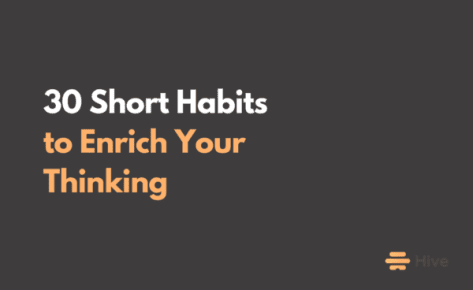Your brain is one of your most valuable assets. It controls your next action — for better or worse. “You are what you think.” While this may be true, it is important to remember that your experiences and environment shape your thoughts.
Thinking clearly is a key skill for success. When you improve your thinking skills, you can quickly make smarter decisions. As you grow, new challenges will emerge, and you’ll need to think outside your usual box.
“Reading furnishes the mind only with materials of knowledge; it is thinking that makes what we read ours,” John Locke once said.
You can improve your thinking skills by engaging in regular activities that challenge your assumptions, expand your knowledge base, build logical thinking skills and strengthen analytical skills.
When you begin to see through the lens of logic and reason, it becomes easier and easier to spot flaws in your thinking. You become less prone to fall prey to biases, cognitive dissonance, confirmation bias, and other “dogmas” that keep your thinking stuck in a rut.
“He who thinks little errs much…” says Leonardo da Vinci. To stay on top of your thinking game and avoid getting locked inside your own head, it’s important to cultivate good thinking habits. Plutarch was right when he said, “The mind is not a vessel to be filled, but a fire to be kindled.”
-
First, exposing yourself to different ideas and perspectives is vital — especially when they challenge our assumptions or beliefs.
-
Challenge your beliefs/ assumptions. If you have a particular worldview, it can be helpful to challenge it with new evidence or viewpoints.
-
Seek credible assumptions. New information never hurts anyone and can even be beneficial in the long run.
-
Spend time with people who challenge your own thinking.
-
To grow and develop as a thinker, you need people with different ways of seeing things.
-
Good thinkers diversity their day, routine or ritual at least once a week.
-
Make reading a daily habit. Reading stimulates your brain and improves both your vocabulary and critical thinking skills.
-
When reading an article, listening to a podcast or watching a YouTube video, take notes on what stood out for you.
-
“Learning without thought is labour lost; thought without learning is perilous.” ― Confucius
-
Spend time with smarter people.
-
Stay away from people who only agree with you or those who pester you until you agree with them instead; this will only hinder your growth.
-
Make it a habit to think about how your thought process works and try to find flaws in your logic if applicable.
-
“When people will not weed their own minds, they are apt to be overrun by nettles.” ― Horace Walpole
-
A healthy diet, regular exercise, and plenty of rest are all essential for optimizing your brain health.
-
Don’t become too sedentary: careful balance between sleep, exercise, and work is essential for your overall brain health.
-
Pay attention to what you are thinking and feeling at any given time. By watching your thoughts, you can become more aware of how your mind works and how you can improve its function.
-
Avoid overwork or deep mental strain if you can: it can make it harder for your brain to perform at peak efficiency.
-
Ask better questions: Start with “Why”. “Judge a man by his questions rather than by his answers.” ― Voltaire
-
Embrace your ignorance but maintain your curiosity. It’s OK not to know everything all the time. Everyone has gaps in their knowledge.
-
Always consider the second and third-order consequences of your actions.
-
“Think twice before you speak, because your words and influence will plant the seed of either success or failure in the mind of another.” — Napoleon Hill
-
Learn to use the four quadrants of the mind: logic, intuition, emotions and creativity. When trying to solve a problem, use all four quadrants by drawing connections between different parts of your brain.
-
Think for yourself: question everything you hear and see without accepting anything at face value. “A man who does not think for himself does not think at all.” — Oscar Wilde
-
Take time to think through any life-changing decision (and its short and long-term effects).
-
Be willing to be wrong — even though this may feel uncomfortable initially, it will ultimately serve you in the long run.
-
A smarter brain thrives on something new. New things strengthen the connections between your neurons and create new pathways for information to flow through your brain more efficiently.
-
Whether learning a new language, taking up a new hobby, or picking up a new skill, your brain will become more intelligent when something new is always challenging.
-
Be more mindful. Notice what is going on around you. This could mean going on a walk or bike ride or simply sitting outside in the fresh air while taking in the sights and sounds of your surroundings.
-
Keep a journal and reflect on your thinking experiences. The more you train your brain to think, the better off you will be.
-
“Thinking is learning all over again how to see, directing one’s consciousness, making of every image a privileged place.” ― Albert Camus
This article originally appeared in Medium.
